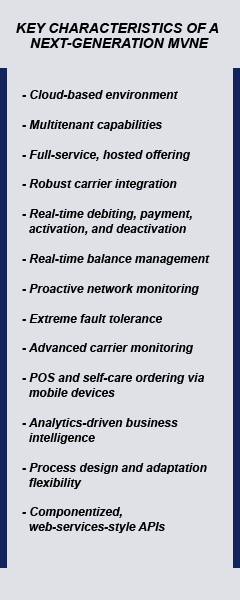Enabling Next-Gen MVNOs
In this particular model the MVNO is taking advantage of the multitenant aspects of its cloud-based MVNE platform to empower its resellers. In short, resellers are using the same system as the MVNO itself (or at least a simplified subset of it), resulting in the latter only having one platform to maintain. The MVNO can then quickly bring new resellers on board by simply providing them with permission-based access to a working production system.
Everyone in the chain, from the MVNO to all of its resellers, benefits from back-end integration with the carrier and other third-party suppliers. They can leverage all the operational aspects of the MVNE platform, including its real-time components, while remaining synchronized and using the most current version of the platform. The plug-and-play reseller model yields major cost, capability and time-to-market (TTM) advantages that not only make the MVNO more competitive in the market, but also a far more attractive partner to major resellers and retailers that can take its business to the next level.
 Embracing analytics
Embracing analytics
This is where MVNOs can outmaneuver major national carriers. With a next-generation MVNE platform that’s strong on analytics, MVNOs can attend to customer needs on a personalized, focused level that is difficult for large operators to achieve. Furthermore, analytical insights can allow them to evaluate their products and sales channels in terms of demand, performance and profitability. An MVNE platform also helps an MVNO shore up customer experience by revealing where consistent issues arise in the sales, support and care processes. The difference between a previous-generation MVNE’s reporting tools and a next-generation MVNE’s analytics is the ability to shift from reactive, static reporting based on old data to proactive business analysis based on current data.
Looking forward
So long as the pace of change in the mobile industry continues to accelerate, the ability to anticipate, adapt to and benefit from that change will be a differentiator. These are perhaps the key characteristics that a next-generation MVNE platform enables for its users, and what sets it apart from traditional platforms. That’s because traditional platforms were designed for traditional business.
Next-generation MVNEs should be designed to deliver established capabilities more efficiently and cost-effectively than before. However, they also need to furnish tools and evolutionary paths that allow MVNOs to adjust to and seize opportunities in new services, business models and market segments, and they should utilize technologies that create cost advantages as well as permit MVNOs to take advantage of sophisticated business capabilities without the burden of maintaining and supporting them.



















